
PHILOSOPHISCHES JAHRBUCH
Scope & Guideline
Fostering Critical Reflections on Contemporary Issues
Introduction
Aims and Scopes
- Historical Philosophy:
The journal frequently publishes research on historical philosophical figures and movements, particularly focusing on the German idealism period, including Kant, Hegel, and Schelling. This reflects a commitment to understanding how past philosophies shape current discourse. - Interdisciplinary Approaches:
The journal emphasizes the importance of interdisciplinary studies, integrating insights from various fields such as ethics, politics, aesthetics, and technology, thereby enriching philosophical inquiry. - Contemporary Issues and Challenges:
A significant focus is placed on contemporary philosophical debates surrounding digitality, ethics, and societal issues, reflecting the journal's engagement with modern challenges and their philosophical implications. - Philosophical Anthropology:
The journal explores themes of human nature, moral normativity, and the implications of philosophical anthropology, contributing to discussions on what it means to be human in a complex world. - Philosophy of Technology:
Recent publications highlight the intersection of philosophy and technology, addressing concerns about artificial intelligence, digital ethics, and the evolving nature of knowledge in the digital age.
Trending and Emerging
- Digital Philosophy:
An increasing number of papers focus on the implications of digital technology on philosophy, exploring themes such as virtual reality, artificial intelligence, and the philosophy of the digital world, which are crucial for understanding modern existence. - Ethics in Times of Crisis:
The journal has seen a rise in discussions surrounding ethical considerations in light of global crises, such as pandemics, climate change, and social justice, reflecting a growing urgency in addressing these pressing issues. - Philosophy of Interdisciplinarity:
There is a notable trend towards exploring the intersections of philosophy with other disciplines, such as science, society, and sustainability, indicating a robust interest in how philosophy can contribute to broader discussions. - Contemporary Political Philosophy:
Recent publications have increasingly engaged with contemporary political philosophy, examining issues like democracy, human rights, and the ethical dimensions of political actions, which are paramount in today's political landscape. - Aesthetic Philosophy:
A growing interest in aesthetics, particularly in relation to crisis and contemporary culture, showcases a renewed focus on how aesthetic experiences shape human understanding and societal values.
Declining or Waning
- Metaphysical Discussions:
There has been a noticeable decline in the number of papers focused on traditional metaphysical inquiries, such as discussions on being, existence, and essence, which were more prevalent in earlier publications. - Classical Ethics:
Papers specifically addressing classical ethical theories and moral philosophy, particularly those rooted in ancient or medieval thought, have seen a reduction, suggesting a shift towards more contemporary ethical dilemmas. - Philosophical Novels and Literature:
The exploration of philosophical themes through literary forms, such as philosophical novels, appears less frequently, indicating a potential decline in interest in this genre within the journal. - Historical Commentary:
While historical analysis remains important, the focus on commentary regarding historical texts and figures has decreased, possibly in favor of more direct applications of philosophy to current issues. - Traditional Political Philosophy:
Traditional discussions on political philosophy, particularly those centered on canonical texts, are less common, reflecting a possible shift towards more pragmatic and contemporary political discourse.
Similar Journals

VERIFICHE
Bridging Ideas and Insights in the World of PhilosophyVERIFICHE, published by ASSOC TRENTINA SCI UMANE, is a distinguished academic journal hailing from Italy, focusing on the intricate field of Philosophy. With an ISSN of 0391-4186, this journal serves as a pivotal platform for scholars and thought leaders engaged in philosophical discourse, examining both theoretical and practical aspects of the discipline. Despite its classification in the Q4 category of the 2023 journal ranks, and a Scopus ranking of #602 out of 806 within the Arts and Humanities, it plays a significant role in contributing to philosophical knowledge and debate. The journal has matured over a significant timeframe, covering topics from 2014 to 2022, and is committed to fostering intellectual engagement among researchers, professionals, and students alike. Although currently not available as an open access journal, VERIFICHE remains an important resource for those seeking to explore the depth of philosophical inquiry and its applications in contemporary society.

Revista de Filosofia UIS
Connecting scholars through accessible philosophical insights.Revista de Filosofia UIS is a prestigious academic journal published by UNIV INDUSTRIAL SANTANDER, dedicated to advancing the field of philosophy through rigorous research and scholarly discourse. With an ISSN of 1692-2484 and an E-ISSN of 2145-8529, this journal has maintained an open access policy since 2007, ensuring that high-quality philosophical insights are accessible worldwide. Based in Bucaramanga, Colombia, the journal aims to foster interdisciplinary dialogue on contemporary philosophical issues, making it an essential resource for researchers, professionals, and students alike. Although it is still in the process of establishing its HIndex and Scopus rankings, the Revista de Filosofia UIS continues to attract contributions from esteemed scholars, solidifying its role as a vital platform for philosophical inquiry and publication.

FILOSOFICKY CASOPIS
Elevating Discussions in Philosophy and Religious StudiesFilosoficky Casopis is a distinguished open-access journal dedicated to exploring the multifaceted dimensions of philosophy and religious studies. Published by the Institute of Philosophy in the Czech Republic, this journal aims to foster interdisciplinary dialogue and contribute to the evolving debates within these fields. With an ISSN of 0015-1831 and a publication history that spans converged years from 2002 to 2024, Filosoficky Casopis offers valuable insights into contemporary philosophical discourse. Despite its current standing in the Q4 quartile in the 2023 rankings for Religious Studies, the journal remains committed to elevating discussions and providing a platform for emerging scholarship. Since adopting an open-access model in 2021, it has expanded its reach and accessibility, ensuring that its content is readily available to researchers, professionals, and students alike. The journal's address is located at Jilska 1, Prague 110 00, Czech Republic, and it stands as a noteworthy publication for those interested in advancing their understanding of philosophical inquiry and its intersection with religious thought.
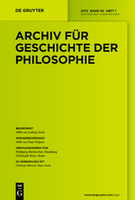
ARCHIV FUR GESCHICHTE DER PHILOSOPHIE
Connecting Generations Through Philosophical InsightsARCHIV FUR GESCHICHTE DER PHILOSOPHIE, published by WALTER DE GRUYTER GMBH, is an esteemed journal that delves into the rich historical landscape of philosophy, tracing conceptual evolution from 1888 through to the present day. With an impact factor reflective of its significance in the field, this journal has achieved a commendable Q2 ranking in Philosophy according to the latest bibliometric assessments. By offering insights into philosophical discourses ranging from the late 19th century to contemporary analysis, the journal serves as an essential resource for scholars, students, and professionals alike. While the journal is not currently Open Access, it remains a critical platform for fostering dialogue and disseminating research in philosophical history, solidifying its reputation as a pivotal source in the humanities. Explore its volumes to gain valuable perspectives on the evolution of philosophical thought and to contribute to an ongoing discourse that spans generations.
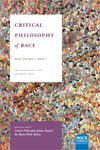
Critical Philosophy of Race
Engaging with profound ideas that shape our understanding of race.Welcome to the Critical Philosophy of Race, a premier academic journal published by Penn State University Press, dedicated to advancing scholarly discourse at the intersection of philosophy and racial studies. Boasting an impressive Q2 ranking in both the fields of Anthropology and Philosophy, this journal cultivates a vibrant platform for researchers and thought leaders to examine and challenge issues related to race, identity, and social justice from critical philosophical perspectives. Featuring contributions that span a diverse array of topics within these disciplines, it serves as a vital resource for professionals and students alike who are invested in understanding the complexities of race in contemporary society. With an E-ISSN of 2165-8692, the journal is committed to fostering open dialogue and disseminating high-quality research, contributing to the ongoing evolution of critical race philosophy. Explore the profound insights published between 2017 and 2024 and engage with transformative ideas that shape our understanding of race today.
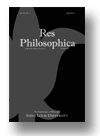
Res Philosophica
Bridging Ideas and Insights in the World of PhilosophyRes Philosophica, published by the Philosophy Documentation Center, is a distinguished journal in the field of philosophy, recognized for its commitment to scholarly excellence. With the ISSN 2168-9105 and E-ISSN 2168-9113, this journal serves as an essential platform for philosophical discourse, encompassing a wide range of topics and perspectives within the discipline. As of 2023, it holds an impressive Q2 ranking in the philosophy category on Scopus, reflecting its substantial impact and relevance, with a rank of #252 out of 806 journals and a percentile placement in the 68th. Res Philosophica aims to foster critical engagement and innovative research among philosophers, academics, and students, while contributing to the enrichment of philosophical literature. Although it currently does not operate under an open access model, it is dedicated to ensuring that high-quality philosophical research continues to thrive, making significant contributions to the academic community.
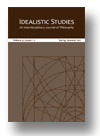
IDEALISTIC STUDIES
Navigating the Intersection of History and ModernityIDEALISTIC STUDIES, published by the Philosophy Documentation Center, is a distinguished academic journal that has significantly contributed to the field of philosophy since its inception in 1996. Recognized in the Q3 category of Philosophy for 2023 and holding a Scopus rank of #333 out of 806 in the Arts and Humanities - Philosophy category, IDEALISTIC STUDIES serves as a platform for scholars to explore and debate the principles of idealism and its relevance in contemporary philosophical discourse. The journal's commitment to advancing philosophical inquiry manifests in its diverse range of articles, critical reviews, and thought-provoking essays that engage with both historical and modern perspectives. Although it operates under a traditional access model, its influence persists among researchers and students alike, cultivating a deeper understanding of philosophical ideals and their impact on society. With a steady publication record continuing through 2024, IDEALISTIC STUDIES remains an essential resource for those dedicated to academic excellence in philosophy.

Filosofia Unisinos
Cultivating Critical Conversations in PhilosophyFilosofia Unisinos, an esteemed journal in the field of Philosophy, is published by the Universidade do Vale do Rio dos Sinos (UNISINOS) in Brazil. Since its inception, the journal has embraced an Open Access approach, welcoming contributions from scholars globally. With its ISSN 1519-5023 and E-ISSN 1984-8234, it has positioned itself as a vital resource, showing consistent growth in academic circuit, reflected by its Q3 Quartile ranking in the 2023 Scopus category for Philosophy, indicating its relevance and contribution to the discipline. Covering a broad range of philosophical inquiries, from theoretical frameworks to contemporary interpretations, the journal offers a platform for rigorous scholarly dialogue and fosters innovative research. As it moves towards its convergence year in 2024, Filosofia Unisinos continues to be pivotal for researchers, professionals, and students interested in exploring the multifaceted landscape of philosophical thought.
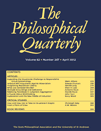
PHILOSOPHICAL QUARTERLY
Fostering Dialogue on Timeless QuestionsPHILOSOPHICAL QUARTERLY, a leading journal in the field of philosophy, is published by Oxford University Press, recognized for its commitment to advancing scholarly discourse since its inception in 1950. With an ISSN of 0031-8094 and an E-ISSN of 1467-9213, this prestigious journal is situated in the United Kingdom, reflecting a rich tradition of philosophical inquiry. The 2023 Category Quartiles rank it in the Q1 tier, demonstrating its substantial impact within the philosophy domain, supported by a Scopus rank of 130/806, placing it in the 83rd percentile of arts and humanities. While it does not currently offer open access, the journal remains a vital resource for researchers, professionals, and students seeking to engage with contemporary philosophical issues and theories. As it continues to publish insightful articles and critical discussions, the PHILOSOPHICAL QUARTERLY stands as a testament to the ongoing evolution and relevance of philosophical scholarship.

RIVISTA DI FILOSOFIA NEO-SCOLASTICA
Exploring the Depths of Neo-Scholastic ThoughtRIVISTA DI FILOSOFIA NEO-SCOLASTICA, published by VITA PENSIERO, is an esteemed journal dedicated to the exploration and advancement of neo-scholastic philosophy. With an ISSN of 0035-6247, this publication serves as a reputable platform for scholars and students deeply engaged in philosophical dialogues, particularly within the context of Italian thought and its historical developments. Although currently classified in the Q4 category in the realm of philosophy, the journal's commitment to scholarly rigor aims to elevate its discourse and relevance within the academic community. Identified among the Arts and Humanities in Scopus, ranking #660 out of 806, the journal seeks to foster a rich understanding of contemporary philosophical issues and debates. Researchers and professionals alike can benefit from the journal's insightful articles, making it a crucial resource for those dedicated to the neo-scholastic tradition in philosophy. It is published in Italy and remains a valuable asset for anyone interested in advancing their knowledge in this specialized field.